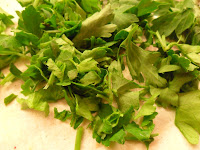One of my favourite Gujarati dishes is "kitchari" - split mung beans (other split lentils work too) and pudding rice cooked up together with a dollop of ghee (or butter) and a bit of salt. My nanima (maternal grandmother) particularly likes it with tomato curry (garlicky, lemony, slightly sweet, lovely - next time I make it, I will attempt to write it up as a recipe, but it's something I very much do by eye) and
sev (crispy gram flour vermicelli noodles).
 |
| Mmm, tomatoes |
When my lovely husband gave me
Ottlenghi: the cookbook, one of the recipes that caught my eye was the one for kosheri and spicy tomato sauce as it sounded pretty similar. So, the other day, that's what I cooked. The full recipe can be found in various places online, e.g.
here but I don't want to plagiarise it by writing it all out.
 |
| Vermicelli noodles looking funny |
It was a strange experience, eating it, because it is indeed very similar to kichari and tomato curry, but subtly different. The Ottlenghil tomato sauce was much tangier due, I think, to the cider vinegar - to be honest, I think I slightly prefer the sweeter, more lemony, Gujarati version of this but it was nice as a change. The kosheri was a much more interesting texture than kitchari, I particularly liked the addition of fried onions, but, really, I think the two dishes mostly just serve different roles: kitchari is a bland, comfort-type food, I sometimes eat left over kitchari for breakfast because it is a bit like porridge; kosheri is more interesting, you could eat it on its own for lunch.
 |
| Mmmm, tomatoes.. |
 |
| Even the worm in the rock dreams of fresh herbs! |
Overall verdict:
how far wrong can you go with tomatoes, lentils, butter-fried vermicelli noodles, and fresh herbs?
 |
| Kosheri |
On the recipe itself.. I love Ottolenghi and, as usual, the recipe was incredibly precise - I always want to ask him, "does it
really matter if I fry this for 7 minutes instead of 6? REALLY?" and, as usual, if you follow it, you will end up with delicious food (
which isn't always the case with cookbooks).
But, this time, I thought the ordering of the recipe was peculiar. It suggests you make things in a sequence that would make the whole process take well over an hour when, if you read the recipe through completely, you can reorder it to make it much faster. In particular, I think it's bizarre that you get to the end of cooking the tomato sauce, then the kosheri and - only then - does he tell you to fry a couple of onions for 20 minutes. I didn't actually mind that much because I did read the whole recipe through and reorder it but, if I were hungry and got to the onion instruction, I'd have been
Quite Annoyed.





No comments:
Post a Comment